
HMN-176
CAS No. 173529-10-7
HMN-176 ( HMN176 | HMN 176 | HMN-176 )
产品货号. M17369 CAS No. 173529-10-7
HMN-176 是一种二苯乙烯衍生物,可抑制有丝分裂,干扰 polo 样激酶 1 (plk1)。
纯度: >98% (HPLC)
 COA
COA
 Datasheet
Datasheet
 HNMR
HNMR
 HPLC
HPLC
 MSDS
MSDS
 Handing Instructions
Handing Instructions
| 规格 | 价格/人民币 | 库存 | 数量 |
| 2MG | ¥413 | 有现货 |


|
| 5MG | ¥648 | 有现货 |


|
| 10MG | ¥988 | 有现货 |


|
| 25MG | ¥1604 | 有现货 |


|
| 50MG | ¥2989 | 有现货 |


|
| 100MG | ¥4447 | 有现货 |


|
| 500MG | ¥9639 | 有现货 |


|
| 1G | 获取报价 | 有现货 |


|
生物学信息
-
产品名称HMN-176
-
注意事项本公司产品仅用于科研实验,不得用于人体或动物的临床与诊断
-
产品简述HMN-176 是一种二苯乙烯衍生物,可抑制有丝分裂,干扰 polo 样激酶 1 (plk1)。
-
产品描述HMN-176 is an active metabolite of the synthetic antitumor compound HMN-214. HMN-176 shows potent cytotoxicity toward various human tumor cell lines, and in mitotic cells, it causes cell cycle arrest at M phase through the destruction of spindle polar bodies, followed by the induction of DNA fragmentation. However, no direct interactions of HMN-176 with tubulin are observed. Moreover, in animal models, it was observed that oral administration of the prodrug HMN-214 caused no significant nerve toxicity, a severe side effect often associated with microtubule binding agents such as Taxol and VCR.3 In Phase I clinical trials, HMN-214 has caused sensory neuropathy and ileus in some patients. However, the grade and frequency of these adverse effects were much lower than those of typical microtubule binding agents. As expected from the mechanism of action of HMN-214 (induction of G2-M arrest in dividing cells), the main adverse effect was neutropenia.
-
体外实验HMN-176 (2.5 μM) greatly increases the duration of mitosis in hTERT-RPE1 and CFPAC-1 Cell lines. The effect of HMN-176 on spindle morphology does not appear to be related to effects on microtubule polymerization. HMN-176 (2.5, 0.25, and 0.025 μM) inhibits aster formation in a concentration dependent manner. HMN-176 (0.1, 1.0, or 10.0 μg/mL) demonstrates inhibitory effects in multiple tumors, with notable activity seen in breast, nonsmall-cell lung, and ovarian cancer specimens. HMN-176 demonstrates activity towards 63% of the breast (5/8), 67% of the non-small cell lung (4/6), and 57% of the ovarian (4/7) tumor specimens treated with 10.0 μg/mL. HMN-176 shows potent cytotoxicity, with a mean IC50 value of 118 nM. HMN-176 displays similar cytotoxicity against tumors with various characteristics from different organs. Treatment with 3 μM HMN-176 suppresses the expression of MDR1 mRNA by 56%. HMN-176 has no significant effect on the residual promoter activity.
-
体内实验After p.o. of HMN-214 to male rats, the prodrug is not detected in the plasma, while plasma levels of HMN-176 peaks at 2 h and gradually decreases thereafter.
-
同义词HMN176 | HMN 176 | HMN-176
-
通路Others
-
靶点Other Targets
-
受体Others
-
研究领域Cancer
-
适应症——
化学信息
-
CAS Number173529-10-7
-
分子量382.43
-
分子式C20H18N2O4S
-
纯度>98% (HPLC)
-
溶解度In Vitro:?DMSO : 30 mg/mL (78.45 mM)
-
SMILESO=S(=O)(c1ccc(OC)cc1)Nc1ccccc1/C=C/c1cc[n+](cc1)[O-]
-
化学全称(E)-4-(2-(4-methoxyphenylsulfonamido)styryl)pyridine 1-oxide
运输与储存
-
储存条件(-20℃)
-
运输条件With Ice Pack
-
稳定性≥ 2 years
参考文献
1. DiMaio MA, et al. Mol Y Ther. 2009 Mar;8(3):592-601.
产品手册




关联产品
-
BRASSINAZOLE
油菜素类固醇是一类植物激素,在植物生长和发育中发挥重要作用,包括促进茎伸长和细胞分裂。 Brassinodium 是一种三唑型油菜素类固醇生物合成抑制剂。
-
Vanillic acid glucos...
Vanillic acid glucoside is a natural product of Vanilla, Orchidaceae. Vanillic acid glucoside can be used as a reference standard.
-
Regaloside E
Regaloside E 是一种可以从 Lilium longiflorum Thunb. 中分离得到的天然产物。



 021-51111890
021-51111890 购物车()
购物车()
 sales@molnova.cn
sales@molnova.cn







